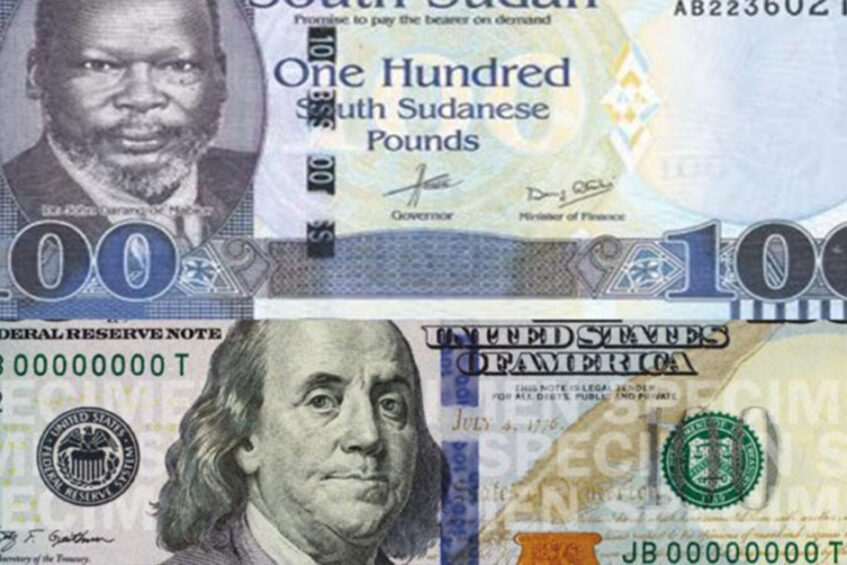
One U.S. dollar is exchanged for over 1,000 South Sudanese pounds in the forex market as of May 27th 2023. | File photo/Courtesy
South Sudanese pound has depreciated at an alarming rate against the U.S. dollars in recent weeks, despite a number of economic policies adopted by the Central Bank to restore the pounds to normalcy.
From early March 2023, the official Central Bank exchange rate for 1 US dollar was at around 800 South Sudanese pounds, and at a slightly higher rate in the black market.
But as of Friday, the official exchange rate has hiked to more than 800 SSP for 1 dollar in the Bank and to more than 900 SSP in the parallel market.
The economy continues to deteriorate even after the introduction of a number of measures including restriction of the use of dollars in local transactions and the pumping of hard currency into the market to contain the high cost of living that has hit households and businesses.
On Thursday, the Central Bank’s Monetary Policy Committee held its ordinary meeting in Juba and discussed the monetary policy “in light of the current and got updates on recent macroeconomic developments.”
The meeting reportedly focused on the foreign exchange market, inflation as well as the condition of the monetary system.
“The meeting noted with concerns the persistent depreciation of South Sudanese pounds against the US dollar and the subsequent increase in prices of imported commodities,” said Bank Governor Johny Ohisa Damian.
The Central Bank attributes the devaluation of South Sudanese pounds and the rising commodity prices to what it terms as tight global and domestic financial condition caused by Russia’s war in Ukraine.
According to the Bank, other factors that contributed to South Sudan’s economic hardship are the U.S. Federal Reserve tightening its monetary policies and banking crisis.
Damian insists that South Sudan is not alone in the economic upheaval, which it said is a global phenomenon.
“The US dollars strengthened sharply against major currencies including but not limited to South African Rand, Egyptian Pounds, Kenyan Shillings or South Sudanese Pounds,” he said.
“In addition, the increase in prices of imported goods elsewhere and major trading partners like Uganda whose prices rose by more than 50% in January, have a strong bearing on food prices in the markets in Juba.”
The inflation is surging just two weeks after the International Monetary Fund approved over 114 million US dollars in loans to help South Sudan address its food insecurity and stabilize the market.
The IMF said the disbursement is expected to provide the country with fiscal space to address food insecurity while maintaining social and growth-enhancing spending as well as boosting reserves.
Central Bank measures
In January 2023, the government introduced regulations including restriction of local transaction in U.S. dollars to stabilize the pounds, a move backed by the IMF.
The banking regulator is pushing for the use of domestic currency as legal tender of the economy to tame the dollar speculation, improve the value of its currency and lower the cost of living.
“It’s prohibited for any institution, official or private within the legal jurisdiction of South Sudan to dominate its commercial transactions in any currency other than SSP. These include rent fees, travel industry, hotels, entertainment services, restaurants, commercial outlets, private services contracts and monetary dealings,” said Mr. Damian.
Meanwhile, the Bank on Thursday introduced eleven measures in an attempt to contain the currency depreciation and the inflationary pressures.
These are; maintaining zero deposit financing policy and enforcement of the Treasury Single Account operations, increasing the amount of Term Deposit Facility Auction from SSP 10 billion to 20.9 billion weekly to drain excess liquidity from the market and lifting of restrictions on the frequency of deposit by commercial banks.
The Bank has also increased South Sudan’s interest rate by 300 points base from 13% to 15 percent – a policy employed widely in Western Banks and most recently by the Bank of England.
This will raise the cost of borrowing from the Central Bank reserve and discourage potential borrowers.
The Bank has also announced the provision of trade finance facility to major importers of strategic commodities including fuel, food and pharmaceuticals.
Moreover, the daily auction of 5 million US dollars a week to Forex bureaus and commercial banks in the market – a measure widely criticized by economists.
Support Eye Radio, the first independent radio broadcaster of news, information & entertainment in South Sudan.
Make a monthly or a one off contribution.
Copyright 2024. All rights reserved. Eye Radio is a product of Eye Media Limited.